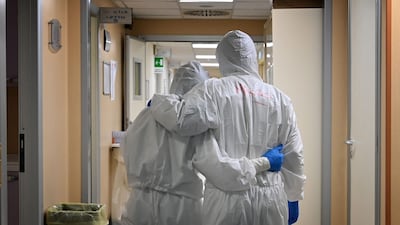Anyone with a nursing qualification could be conscripted into the fight against the coronavirus in a Swiss region preparing for staff shortages.
The scattergun search for staff comes with the fast-spreading Omicron variant causing 95 per cent of infections in Grisons and expected to stretch hospitals.
Switzerland is enduring record infection numbers, like much of Europe, and moved on Wednesday to shorten the isolation period from 10 days to five for people who test positive.
In Grisons, authorities went further by ordering anyone with certain medical qualifications to make themselves known if they are not already practising. The list includes basic apprenticeships, master’s degrees and doctorates in nursing.
Once a list of qualified nurses is compiled, people in this category may be ordered into action to ease shortages, said a statement from the canton.
The canton cited a section of Swiss law which allows authorities to call people up to fight infectious diseases. It did not say if there would be a penalty for keeping quiet.
“In the current exceptional circumstances, it is unavoidable that health and care facilities will have to deal with personnel shortages,” it said.
“We have to assume that the strong increase in coronavirus cases will push medical care and nursing capacity to their limits.”

The canton said testing capacity was similarly strained, with about one in 20 of its residents in isolation as of Monday.
The potential call-up does not apply to people over 65 or with health conditions such as diabetes that would put them at higher risk from the virus.
It echoes a request by British authorities, dealing with staff shortages compounded by Brexit, for Germans with a certain type of driving licence to consider becoming hauliers.
Elsewhere, an Austrian energy company said last month that some of its staff would be moved to on-site dormitories to stop Omicron-related absences from causing power cuts.
The Swiss federal council said it would “act swiftly” with further measures if needed, such as closing shops or capping attendance at public events.
Although the Omicron variant has milder effects, a high number of cases is still expected to cause a surge in hospital admissions.
“The epidemiological situation is critical and remains difficult to assess,” the Swiss government said.


